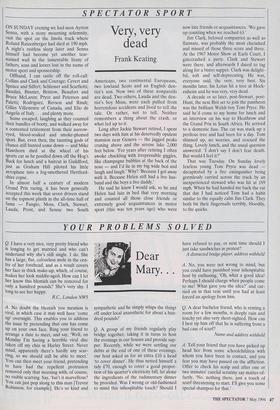SPECTATOR SPORT
Very, very dead
Frank Keating
ON SUNDAY evening we had seen Ayrton Senna, with a stony mourning solemnity, visit the spot on the Imola track where Roland Ratzenberger had died at 190 mph. A night's restless sleep later and Senna himself had become yet another tear- stained wail in the lamentable litany of fathers, sons and lovers lost in the name of motor sport and sponsorship.
Offhand, I can rattle off the roll-call: Collins and Clark and Courage; Cevert and Spence and Siffert; Schlesser and Scarfiotti; Bandini, Binnier, Bristow, Beaufort and Bruce McLaren; Pryce and Peterson and Paletti; Rodriguez, Revson and Rindt; Gilles Villeneuve of Canada, and Elio de Angelis of Italy .. . and plenty more.
Some escaped, laughing as they counted their bundles of booty, and walked away for a contented retirement from their narrow- eyed, blood-soaked and smoke-plumed sport. But, even then, the taunting gods of chance still hunted some down — and Mike Hawthorn died at the wheel of his sports car as he pootled down off the Hog's Back for lunch and a haircut in Guildford, Just as Graham Hill piloted his little aeroplane into a fog-smothered Hertford- shire copse.
In almost half a century of modern Grand Prix racing, it has been generally accepted this week that seven drivers stand on the topmost plinth in the all-time hall of fame — Fangio, Moss, Clark, Stewart, Lauda, Prost, and Senna: two South Americans, two continental Europeans, two lowland Scots and an English den- tist's son. Now two of these nonpareils are dead. Two others, Lauda and the den- tist's boy Moss, were each pulled from horrendous accidents and lived to tell the tale. Or rather, not to tell. Neither remembers a thing about the crash, or what led up to it.
Long after Jackie Stewart retired, I spent two days with him at his deservedly opulent mansion near Geneva — the jagged peaks craning above and the serene lake 2,000 feet below. 'For years after retiring I often awoke chuckling with irrepressible giggles, like champagne bubbles at the back of the nose — and I'd lie in my big wide bed and laugh and laugh.' Why? 'Because I got away with it. Because Helen still had a live hus- band and the boys a live daddy.'
He said he knew I would ask, so he and Helen had lain in bed that very morning and counted all those close friends or extremely good acquaintances in motor sport (this was ten years ago) who were now late friends or acquaintances. 'We gave up counting when we reached 63.'
Jim Clark, beloved compatriot as well as flatmate, was probably the most cherished and missed of those three score and three. At the 1967 Motor Show at Earls Court, I gatecrashed a party. Clark and Stewart were there, and afterwards I dared to tag along for a bistro supper. Clark was delight- ful, soft and self-deprecating. He was, everyone said, the very, very best. Six months later, his Lotus hit a tree at Hock- enheim and he was very, very dead.
A decade or so later, post-Stewart, post- Hunt, the next Brit set to join the pantheon was the brilliant Welsh boy Tom Pryce. He said he'd come to my home for lunch and an interview on his way to Heathrow and the Grand Prix in South Africa. He arrived to a domestic fuss. The cat was stuck up a perilous tree and had been for a day. Tom shinned up, no worries, and rescued the thing. Lovely lunch, and the usual question answered: 'I don't say I don't fear death. But would I feel it?'
That was Tuesday. On Sunday lovely fearless young Tom Pryce was dead decapitated by a fire extinguisher being gormlessly carried across the track by an inexperienced steward who was hit at 189 mph. When he had handed me back the cat that day I had noticed Tom had a habit similar to the equally calm Jim Clark. They both bit their fingernails terribly, bloodily, to the quicks.


















































 Previous page
Previous page